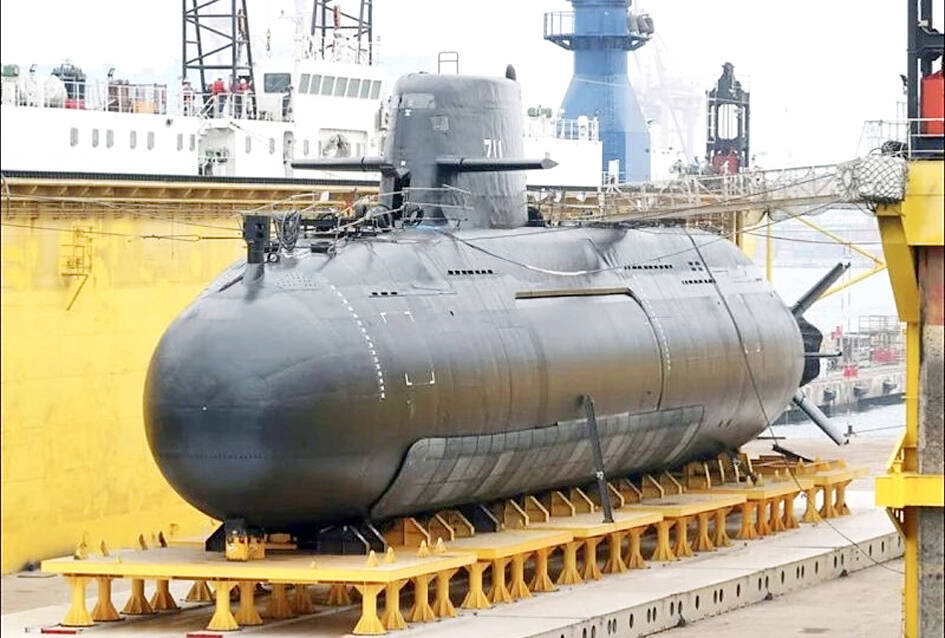Admiral Huang Shu-kuang (黃曙光), who heads the Indigenous Defense Submarine Program, and Cheng Wen-lon (鄭文隆), chairman of shipbuilder CSBC Corp, Taiwan (台灣國際造船), are expected to be on board during the Hai Kun submarine’s sea acceptance test this month.
Taiwan received the first shipment of long-awaited mast sensor components from the US, boosting hopes that the submarine could undergo its sea acceptance test on schedule, a defense official said yesterday.
Shipments of the L3Harris Photonics Mast parts were four months behind schedule, sparking worries that the prototype diesel-electric sub would not be ready for the test, they said.

Photo: Lee Hui-chou, Taipei Times
The component Taiwan received last week was either the optical periscope or electronic periscope that together make up the mast, they said, adding that the other half of the system is expected next week.
This means the Hai Kun could be fitted with the mast and battery systems in time to undertake the crucial test later this month as planned, they said.
The sea acceptance test consists of 31 capability trials divided into four main categories, which are surface navigation, shallow water navigation, deep water navigation and combat system operations.
To pass the acceptance test, the sub must demonstrate the performance of its independent power generator, voice communication system and torpedo launch systems, among others.
Previously, president-elect William Lai’s (賴清德) staff announced that Huang would be retained on the National Security Council, indicating that he would continue to be the submarine program’s head, they said.
Huang’s involvement in the test would mark the fulfillment of a personal promise to the development team that he would be in the boat at the moment of its acceptance, the official said.
Separately, President Tsai Ing-wen (蔡英文) has presented medals to 11 people key to the Indigenous Defense Submarine Program, including some team members publicly named for the first time.
Tsai on Wednesday awarded 22 people for their contribution to national defense in a ceremony marking one of her last acts in office before the transfer of power to Lai on Monday.
The list of the submarine project’s members who received honors included Huang, Ministry of National Defense counselor Vice Admiral Shao Wei-yang (邵維揚), Naval Shipbuilding Development Center head Ku Chih-chung (顧志中) and center chief engineer Tsao Chih-tao (曹智韜).
They additionally included CSBC chairman Cheng Wen-lon, general manager Wei Cheng-ssu (魏正賜), deputy general manager Tsai Kun-tsun (蔡坤宗), deputy section head Lo Chih-hung (羅志宏), factory manager Liu Ssu-wei (柳思巍) and special assistant to the chairman Kao Wen-kuei (高文魁), as well as National Chungshan Institute Sheng Lung project director Sun Chun-ching (孫春青).
Sun headed the Sheng Lung Project of elite engineers who developed the indigenous portion of the submarine and tested its systems, subsystems and equipment.
The project team was also charged with developing equipment whose foreign suppliers unexpectedly dropped out, including torpedo decoys that Turkey declined to supply after China intervened.

WAITING GAME: The US has so far only offered a ‘best rate tariff,’ which officials assume is about 15 percent, the same as Japan, a person familiar with the matter said Taiwan and the US have completed “technical consultations” regarding tariffs and a finalized rate is expected to be released soon, Executive Yuan spokeswoman Michelle Lee (李慧芝) told a news conference yesterday, as a 90-day pause on US President Donald Trump’s “reciprocal” tariffs is set to expire today. The two countries have reached a “certain degree of consensus” on issues such as tariffs, nontariff trade barriers, trade facilitation, supply chain resilience and economic security, Lee said. They also discussed opportunities for cooperation, investment and procurement, she said. A joint statement is still being negotiated and would be released once the US government has made

NEW GEAR: On top of the new Tien Kung IV air defense missiles, the military is expected to place orders for a new combat vehicle next year for delivery in 2028 Mass production of Tien Kung IV (Sky Bow IV) missiles is expected to start next year, with plans to order 122 pods, the Ministry of National Defense’s (MND) latest list of regulated military material showed. The document said that the armed forces would obtain 46 pods of the air defense missiles next year and 76 pods the year after that. The Tien Kung IV is designed to intercept cruise missiles and ballistic missiles to an altitude of 70km, compared with the 60km maximum altitude achieved by the Missile Segment Enhancement variant of PAC-3 systems. A defense source said yesterday that the number of

Taiwanese exports to the US are to be subject to a 20 percent tariff starting on Thursday next week, according to an executive order signed by US President Donald Trump yesterday. The 20 percent levy was the same as the tariffs imposed on Vietnam, Sri Lanka and Bangladesh by Trump. It was higher than the tariffs imposed on Japan, South Korea and the EU (15 percent), as well as those on the Philippines (19 percent). A Taiwan official with knowledge of the matter said it is a "phased" tariff rate, and negotiations would continue. "Once negotiations conclude, Taiwan will obtain a better

FLOOD RECOVERY: “Post-Typhoon Danas reconstruction special act” is expected to be approved on Thursday, the premier said, adding the flood control in affected areas would be prioritized About 200cm of rainfall fell in parts of southern Taiwan from Monday last week to 9am yesterday, the Central Weather Administration (CWA) said. Kaohsiung’s Taoyuan District (桃源) saw total rainfall of 2,205mm, while Pingtung County’s Sandimen Township (三地門) had 2,060.5mm and Tainan’s Nanhua District (南化) 1,833mm, according to CWA data. Meanwhile, Alishan (阿里山) in Chiayi County saw 1,688mm of accumulated rain and Yunlin County’s Caoling (草嶺) had 1,025mm. The Pingtung County Government said that 831 local residents have been pre-emptively evacuated from mountainous areas. A total of 576 are staying with relatives in low-lying areas, while the other 255 are in shelters. CWA forecaster